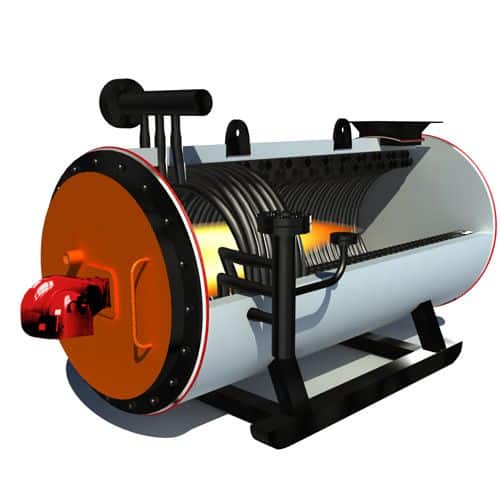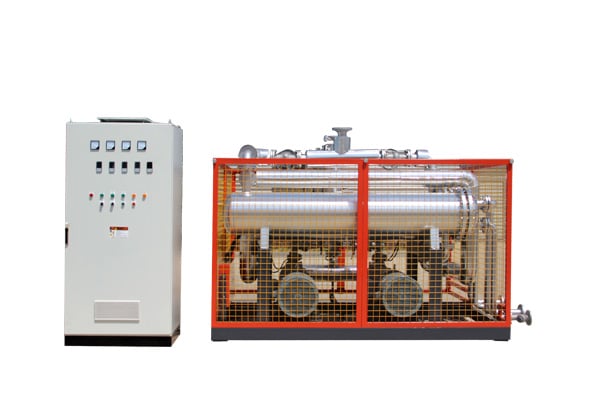In the field of industrial heating, gas boiler and electric thermal oil heater https://8ruiyan.com/en/all-organic-heat-carrier-boilers/are two widely used thermal energy systems. Choosing the right heating solution is crucial for production efficiency, energy costs, and environmental compliance. This article provides a detailed comparison of these technologies—covering working principles, pros & cons, and cost factors—to help you make an informed decision.
1. Working Principle Comparison
🔹 Gas Boiler System
A gas boiler generates heat by burning natural gas (NG), liquefied petroleum gas (LPG), or other combustible gases. The released heat is transferred to water via a heat exchanger, producing steam or hot water. Key components include:
✔ Bruciatore (for combustion)
✔ Heat exchanger (transfers heat to water)
✔ Water supply system
✔ Control & safety systems

🔹 Electric Thermal Oil Heater
An electric thermal oil heater uses electrical resistance heating to warm thermal oil, which is then circulated via a pump to deliver heat. Main components:
✔ Electric heating elements
✔ Expansion tank (accommodates oil expansion)
✔ Circulation pump
✔ Filtration & control systems

2. Pros & Cons Analysis
✅ Advantages of Gas Boilers
✔ Lower operating costs (where gas is cheap)
✔ High efficiency (90%+ with condensing models)
✔ Fast heat-up time
✔ Suitable for high-power, continuous use
✔ Mature, widely supported technology
❌ Disadvantages of Gas Boilers
✖ Emissions (NOx, CO₂) → environmental concerns
✖ Explosion/gas leak risks → strict safety measures needed
✖ Requires gas infrastructure
✖ Higher maintenance (burner cleaning, heat exchanger upkeep)
✖ Larger footprint (needs a boiler room)
✅ Advantages of Electric Thermal Oil Heaters
✔ Zero on-site emissions (clean & eco-friendly)
✔ Precise temperature control (±1°C or better)
✔ Safer (no open flames, lower explosion risk)
✔ Compact & flexible installation (no flue required)
✔ Low maintenance (no burners/combustion parts)
❌ Disadvantages of Electric Thermal Oil Heaters
✖ Higher electricity costs (vs. gas in most regions)
✖ Dependent on stable power supply
✖ Limited max power (grid capacity constraints)
✖ Higher upfront cost (especially for large systems)
✖ Thermal oil degrades over time (replacement needed every 3-5 yrs)
3. Cost Breakdown
💰 Initial Investment
| System | Key Costs |
|---|---|
| Gas Boiler | Boiler unit, gas piping, flue, water treatment |
| Electric Heater | Heating elements, transformers, electrical upgrades |
💡 Electric systems typically cost more upfront, especially for high-power applications.
Operating Costs (Example: 1 Million kcal Heat Output)
| Factor | Gas Boiler | Electric Heater |
|---|---|---|
| Efficiency | 85-95% | 95-98% |
| Energy Price | ¥3/m³ (gas) | ¥0.8/kWh (electricity) |
| Hourly Cost | ~¥360 | ~¥968 |
| Annual Cost (8,000 hrs) | ~¥2.88M | ~¥7.74M |
📌 *Electric heaters are cleaner but often 2-3x more expensive to run than gas boilers.*
🔧 Maintenance Costs
✔ Gas Boiler: ~2-3% of initial cost/year (burner servicing, safety checks)
✔ Electric Heater: ~1-1.5% of initial cost/year (electrical checks, oil replacement)
⏳ Lifespan & Long-Term Costs
- Gas boilers: 15-20 years (longer lifespan)
- Electric heaters: Heating elements last 5-8 years; oil replaced every 3-5 years
4. Best Applications
When to Choose a Gas Boiler:
✔ Large-scale industrial heating (factories, refineries)
✔ Regions with cheap & stable gas supply
✔ Steam generation required
✔ Lower long-term costs prioritized
When to Choose an Electric Heater:
✔ Strict emission zones (urban areas, cleanrooms)
✔ Precision temperature control needed (pharma, food processing)
✔ No gas infrastructure available
✔ Space-constrained installations
5. Future Trends
🔮 Hybrid systems (gas + electric for efficiency)
🔮 Smart IoT integration (remote monitoring & automation)
🔮 Renewable energy pairing (solar/wind + electric heating)
🔮 Hydrogen boilers (potential game-changer for gas systems)
6. Key Decision Factors
✔ Energy costs & availability (gas vs. electricity pricing)
✔ Environmental regulations (local emission laws)
✔ Process needs (temperature precision, heat medium)
✔ Total cost of ownership (not just upfront price)
✔ Space & infrastructure constraints
📢 Final Recommendation:
For technical inquiries, contact Ruiyuan’s official support team!
📞 📞 📞
Whatsapp:86-19106101570
wechat:86-19106101570
email:nieyili@cnryan.com
